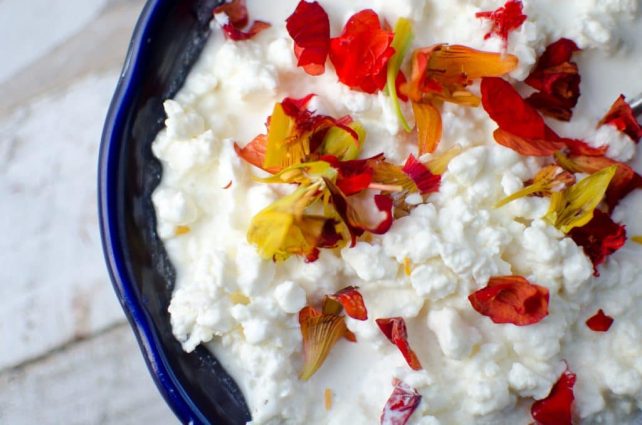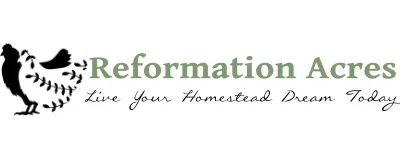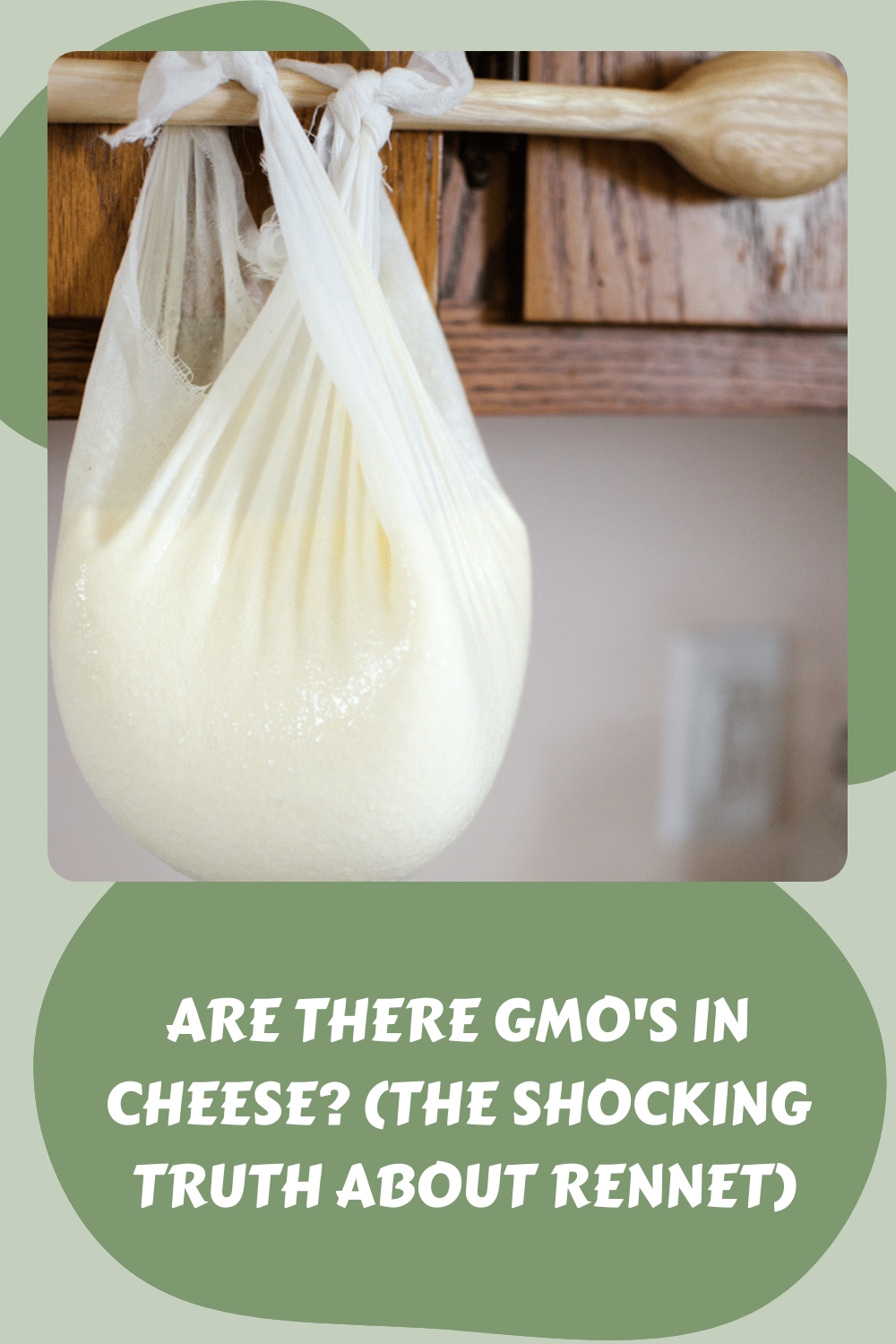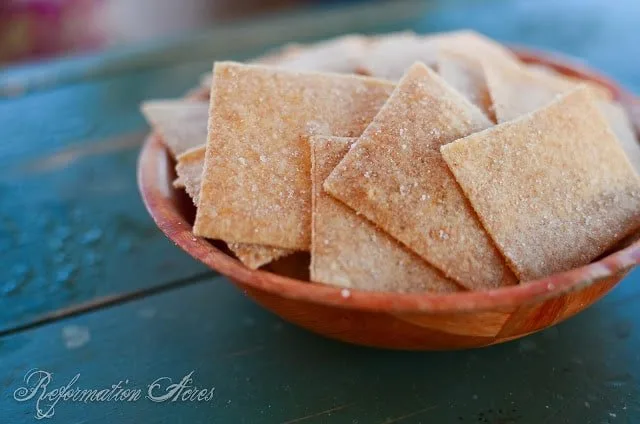Are There GMO’s in Cheese? (The Shocking Truth about Rennet)
Are there GMO’s in cheese? The truth of what might be in the rennet you use home cheesemaking might surprise you. I know it sure shocked me!

Are there GMOs in cheese?
I don’t know about you, but we put a great deal of effort and expense into avoiding genetically modified ingredients. We raise & butcher 99.5% of our family’s meat, purchase heirloom seeds for our garden, and avoid convenience foods.
There are lots of reasons we do all this work. Not the least of which is to make sure we’re avoiding as many GMO’s as possible. It never occurred to me there may be GMO’s in the rennet I use to make cheese.
I’m not one to engage in fear-mongering. But when it comes to the safety of GMO’s, I believe the jury is still out. I’m not convinced they are safe for our bodies to ingest. The fact is, there have been no long-term, generational studies done on people.
I can’t simply trust those with an agenda in getting me to believe they’re safe. I’m responsible for caring for these children’s bodies while they’re with me. And I’m not about to make guinea pigs out of them.
So you can imagine my surprise when I learned the truth about most of the cheese made in America. (Including the fresh cheese I was making with raw milk from our Jersey cows in my very own kitchen!)
Genetically modified (GM) rennet is coagulating it! I am dumping my bottle down the drain!
After reading through The Art of Natural Cheesemaking: Using Traditional, Non-Industrial Methods and Raw Ingredients to Make the World’s Best Cheeses, I learned that there is more to rennet than meets the eye.
The decision of which rennet to use in your cheese making isn’t as simple as tablet form or liquid rennet, vegetable or animal.

What is Rennet
Rennet is the enzyme used to cause the separation of milk proteins into solid curds and whey. It is essential for making different types of cheeses such as mozzarella, cheddar and aged cheese, as well as hard cheese, like Parmesan, Gorgonzola, and Gruyere.
Types of Rennet
There are 4 types of rennet used in cheesemaking according to the book:
1. Animal Rennet
[True rennet is ] a mixture of enzymes, including chymosin and pepsin that help coagulate milk into cheese.
Originally, rennet came from the stomaches of un-weened ruminants. As babies, these ruminants, such as cow (calf), sheep (lamb), goats (kid), have what is often called a milk stomach. The enzymes in this stomach curdles the milk and makes it digest easier.
In essence, the babies make cheese in their stomach so they can get the most out of the milk. As the animal grows and begins to eat more grass and forage, these enzymes get less and less as the need for milk reduces.
In the USA, it is considered unethical because it is made from the stomachs of milk-fed calves, a by-product of the veal industry. Consequently, it has become increasingly expensive and difficult to obtain as the market for veal declines.
2. Vegetable Rennet
Vegetable rennets are coagulating agents of plant origin… They are not as effective as other milk-clotting enzymes and do not allow a cheesemaker to handle the curds in exactly the same manner. Commercial supplies of these vegetable rennets are difficult to find.
Plants that produce coagulation are nettles, artichokes, and cardoon thistle (often referred to as thistle rennet).
3. Microbial Rennet
[These are] fungal cultures that naturally produce enzymes that coagulate milk much like rennet. Unfortunately, [they] do not make cheese that’s as good as what calf rennet creates. These synthetic enzymes can give cheese a rubbery texture and, when aged, an upsetting bitterness. As well, the curd formed by microbial enzymes behaves slightly differently from rennet curd and can create complications.
4. FPC Enzyme (Fermentation Produced Chymosin)
FPC is produced with the aid of transgenic bacteria, specifically species of E.coli or Aspergillus niger that have been given a gene from a cow expressing the production of chymosin, which allows the microorganisms to synthesize the enzyme in bio-reactors without the slaughter of calves.
Most American cheesemakers use this type of rennet in cheese production. A rennet created as the result of genetic modification.
GM rennet was not subject to a review when it was given Generally Regarded As Safe status by the US Food and Drug Administration.
Furthermore, David Asher argues in The Art of Natural Cheesemaking not only are the alternatives equally unethical but often ineffective and possibly harmful.

What’s a cheesemaker to do? Asher recommends using products from WalcoRen which creates a certified GMO-Free rennet.
The Art of Natural Cheesemaking
For the homesteading cheesemaker, you should really get your hands on The Art of Natural Cheesemaking!
Asher has a unique approach to cheesemaking process that I find intriguing. His method is much like capturing wild yeast from the air for sourdough bread baking. He creates raw milk cheeses and appreciates the connection between animal health, proper milk handling, and tasty cheese.
His philosophy is “Good milk, rennet, and salt. Together with your capable hands, and the cool and humid environment of an aging cave, these are the only ingredients needed to make good cheese.” No mention of purchasing sundry “starter cultures, freeze-dried fungal spores, microbial and genetically modified rennets.” Nor does he use calcium chloride, chemical sanitizers, or harsh nitric and phosphoric acids.”
It truly is a “self-sufficient” guide to cheese.
Asher takes you through those 3 essential ingredients and elaborates on the importance of the quality of each. He introduces you to the tools of the trade. And he guides you to create your own cheese cave before diving into teaching you to culture and ferment your own cheese products.
In addition, there are many recipes to try your hand at making. These include kefir, Chevre, Feta, Blue Cheeses, Brie, Camembert, Washed-Rind Cheeses, Mozzarella, Clothbound Cheddar, Gouda, Alpine Cheese, Ricotta, and even Cultured Butter.
And he even teaches you how to make your own rennet. (There’s a homesteading skill for you!)
So if you want to learn to make cheese at home without being dependent upon outside suppliers to make quality cheese, this is the book for you!
I’m thankful for the eye-opening and that I’ve learned of safe alternatives for my family!

- Asher, David (Author)
- English (Publication Language)
- 320 Pages – 07/08/2015 (Publication Date) – Chelsea Green Publishing (Publisher)
Last update on 2024-04-18 at 21:55 / Affiliate links / Images from Amazon Product Advertising API













unless you are using rennet scraped from the stomach of a baby cow (veal) all hard cheese is made with GMOs
https://io9.gizmodo.com/you-can-thank-genetic-engineering-for-your-delicious-ch-1701156684
by hard i mean aged as vegetable and non GMO Microbial Enzyme do not generally produce a reliable aged cheese
I'm so glad you got a copy of this book! I think I recomended it to you last summer when it first came out and I met David at our Farmers market 🙂 As soon as I read the name of the company that makes the renet and starters on the market, I thought of you and a few other people I know of who make cheese and would be horrified! I can't wait until April when we move into a house with a kitchen that's more than 3 square feet and I have room to start making our cheese!
Wow…they are just trying to sneak that stuff in everywhere! I have only made mozzerella cheese once with some friends and that was really labor intensive to me and I believe that is one of the easiest cheeses to make, right? Thanks for sharing the info with us. Whenever I do get around to making cheese I'll be using this book as a resource. Another book to add to the wish list! Blessings from us at Serenity Farm!
I am so glad you wrote this Quinn! I've searched for real rennet and the only animal rennet I could find had all sorts of nasty sounding stuff in it. I thought the vegetable stuff was the only kind I could get. I'm going to have to get this book too, I can't wait to start making our cheese.
Wow Quinn, I cannot thank you enough for this post! I too put great effort into avoiding gmos and never would have suspected that rennet could be a problem!
I’ve gotta get that book…
Well and the thing is (to be totally honest), I find cheesemaking to be… how do I say this kindly? Labor intensive. You put a lot of work into it for in our family one meal’s worth of cheese and to go and learn it was all for nothing. To say I’m glad for the eye opener is an understatement.